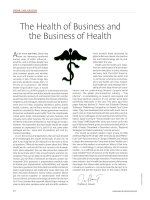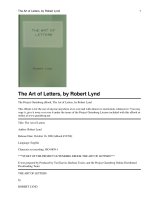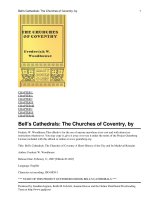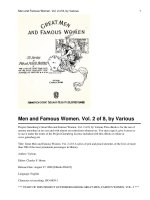Voices of Liberation pptx
Bạn đang xem bản rút gọn của tài liệu. Xem và tải ngay bản đầy đủ của tài liệu tại đây (469.96 KB, 173 trang )
Free download from www.hsrc
p
ress.ac.za
Voices of Liberation
Albert Lutuli
Free download from www.hsrc
p
ress.ac.za
Free download from www.hsrc
p
ress.ac.za
Voices of Liberation
Albert Lutuli
Volume 1
Gerald J Pillay
Free download from www.hsrc
p
ress.ac.za
© The Author, 1993
All rights reserved. No part of this publication may be reproduced or transmitted in
any form or by any means, electronic or mechanical, including photocopy, recording
or any information storage and retrieval system, without permission in writing from
the publisher.
ISBN 0-7969-1356-0
Published by:
HSRC Publishers
134 Pretorius Street
Pretoria
South Africa
Electronic data capture: Tina Dicker
Cover design: Glen Basson
Printed by:
HSRC Printers
134 Pretorius Street
Pretoria
South Africa
Free download from www.hsrc
p
ress.ac.za
Foreword
The racially based ideology that has structured South African society
for the last 40 years was maintained in many ways, one of which was
the controlling of the freedom of speech and the flow of information.
Even the nature and scope of ostensibly ‘scientific research’ did not
escape influence. Inevitably, over a period this South African society
has become divided against itself: “us” versus “them”; “maintainers
of law and order” versus “communists”, “believers”, “secularists” and
so on. These categories bedevilled the recording of South African
history as history syllabuses in schools amply illustrate.
Overcoming these divisions must surely begin with a re-inter-
pretation of history — the painting of a fuller picture in place of the
snapshots that have survived. This task of reinterpreting South
African history is a complex one for many contributions previously
ignored and many perspectives never before acknowledged now need
to be embraced. History can no longer simply be a tool in the hands
of ideologues of any persuasion, because no one group, community or
class has a “God’s-eye” view of history.
This series is a contribution to this process of reinterpretation. It
will make accessible the thoughts and writings of South Africans who
have influenced the dismantling of one of the most daring attempts at
social engineering in modem times. The passing away of apartheid
will continue long after it is legally dead. The violence and double-
speak that accompanied this passing away, will hopefully, prove to be
the last convulsive movements of the corpse.
The struggle to free South African society from the shackles of
race discrimination, political oppression, tyranny, inequality before
the law, greed and fear was long and painful, and was conducted on
many levels by a wide variety of thinkers and activists. Any
reassessment that ignores this polyphonic voice of the liberation
struggle will only succeed in producing a distorted historical one-
dimensionality. Indeed, the struggle made strange bed-fellows:
Christians, Hindus, Muslims and Jews, communists, pacifists, African
nationalists, feminists, trade-unionists, Pan-Africanists, English
liberals and human rights activists among others.
Free download from www.hsrc
p
ress.ac.za
This series, therefore, is called “The Voices of Liberation” and
includes amongst its titles names such as Albert Lutuli, Robert
Sobukwe, Mahatma Gandhi, Ruth First, Z.K. Matthews, Alan Paton,
Desmond Tutu, Beyers Naude and Nelson Mandela. These
personalities representing different intellectual and political traditions,
have either dramatically or more sedately kept open the possibilities
for liberation.
Each volume, like this one on Lutuli, provides an analysis of the
key ideas of each figure who contributed to liberation thinking in
South Africa. A selection of their main writings will be accompanied
by commentary, together with a comprehensive bibliography of
primary sources to further scholarly research.
A work of this kind depends on the assistance of many. I am
especially indebted to Hans Ponofsky, the former curator of the
African Studies library at Northwestern University, Illinois; Professor
John Hunwick, the head of the Department of the History and
Literature of Religions at the same university, to which department I
was attached during my research there; Professor Richard Elphick one
of the consulting editors for the series; and to Claudia Davidson and
her publishing team at the Human Sciences Research Council.
Free download from www.hsrc
p
ress.ac.za
His thinking and writings
history will say, and because history cannot be banned I can
tell you what history will say, that a noble voice was silenced
when it would have been better for us all if it had been heard.
Alan Paton (from his speech at Albert Lutuli’s funeral)
Free download from www.hsrc
p
ress.ac.za
Free download from www.hsrc
p
ress.ac.za
Early life
ohn Albert Mavumbi Lutuli was born in 1898 in what was
formerly Rhodesia.
1
His father had gone there from Natal to be
an evangelist for the Seventh Day Adventist Mission. When Albert
was barely six, his father died and his mother brought the children
back to their traditional home in the Umvoti Reserve in Natal
2
.
At the time of their relocation in 1908, Albert’s uncle, Martin
Lutuli, was the chief of the Abasemakholweni tribe and it was
within the extended family of the chief that Albert was raised.
Martin Lutuli had been involved in the founding of the Natal
Native Congress in 1901 and the South African Native National
Congress in 1912. It had been a policy of the Natal government to
settle Africans in reserves or ‘Native locations’ as they were often
called. By the turn of the century about 175 000 acres had been set
out as ‘mission reserves’. On these reserves lived a number of
communities of Christian Africans (about 100 000 Kolwe by 1900)
under traditional chiefs, not all of whom were Christians
themselves.
3
The Umvoti Reserve of the Abasemakholweni was a
predominantly Christian community of about 5 000 under a
Christian chief who was a leading member of the Congregational
Church of the American Board Mission (ABM). By 1906 the
ABM had become well established at the Reserve and the area was
called Groutville, after its pioneering missionary, Adam Grout.
These settlements of Africans were part of the general policy
of the Natal government by which the social mobility of Africans
could be controlled. Traditional leaderships were bolstered,
provided these supported government policy. From the govern-
1
This birth date was Lutuli’s estimate. Also, he preferred this spelling of ‘Lutuli’
though ‘Luthuli’ also appears in the newspaper reports and other archival sources.
2
Mary Benson’s biography Chief Albert Lutuli of South Africa Oxford: Oxford
University Press, 1963, covers many details of his life and work. So does his
autobiography Let my People Go Glasgow: Collins, 1982.
3
Marks, S. Reluctant Rebellion – The 1906-1908 disturbances in Natal Oxford,
Clarendon Press 1970, described the leadership structure in the reserves and the
ambiguities of the Kolwe in 1906, the year of the Babata rebellion in Natal.
J
Free download from www.hsrc
p
ress.ac.za
Voices of Liberation 4
ment’s point of view it was a ‘happy’ arrangement. The chiefs
were left to manage the local matters of the tribe while the
government had the benefit of a ‘natural’ influx control.
Traditionally the majority of these tribes passed the chieftainships
down by lineage. By the turn of the century, many of these chiefs
were appointed by the government. It was, therefore, in the chiefs’
interest to be loyal to the government.
The Abasemakholweni were among only a very few who
elected their chief democratically. Lutuli was later to complain that
the chiefs were being made ‘minor dictators’, contrary to the
traditions of the Zulu which were ‘democratic’: “Our development
is being sidetracked into new autocratic institutions that are now
being imposed not only on the Africans but also on white people”.
4
Albert had a remarkable mother. Through hard work and
sacrifice she, a young widow, raised her children and provided for
their early schooling in economically difficult times. For instance,
she took in washing from white families in Stanger, the nearby
town on the Natal North Coast. A devout Christian, she raised her
children in a deeply religious household with her relatives
prominently placed in the American Board Mission. Albert’s early
schooling was at the ABM school in Groutville.
5
From Groutville to Adams College
After Groutville Primary, Albert studied in Edenvale in Natal
where he obtained preliminary training to be a teacher.
6
He
obtained a bursary to Adams College at Amanzimtoti, just south of
Durban, where he was awarded the Higher Teacher’s Certificate.
He was then appointed to the staff of the Teachers’ Training
Department of Adams College. He turned down the offer of a
4
In Chief Speaks: Statements and addresses published by the Solidarity Committee of
the German Democratic Republic 1982.
5
Benson, M. Chief Albert Lutuli of South Africa, p. 4 f.
6
It was possible to become a teacher with a Standard 8 qualification. At Adams
College he upgraded his qualifications obtaining the equivalent of a matriculation
which would have gained him admission to Fort Hare College for a degree course.
Free download from www.hsrc
p
ress.ac.za
Albert Lutuli 5
bursary to study for a degree at Fort Hare College because he felt
he had to help support his family.
Adams College, founded by the American Board Mission, was
at the time one of the leading educational institutions for Africans.
Some of the principals of the college had tried to change the
prevailing view in Natal that only Europeans were able to head
these mission institutions. In 1935, C.T. Loram had urged that
leadership be transferred to black South Africans but Edgar H.
Brookes, when he became principal, opted for a more gradual
transference of control. What was achieved was that Africans were
increasingly appointed as teachers. A.E. Ross first experimented
with the Normal College, appointing African teachers there. This
proved successful and he began appointing Africans to the staff of
the high school as well. E.H. Brookes took the ‘experiment’
further and by July 1952 white graduates were serving under
Africans at the school — an exceptionally rare occurrence
anywhere in South Africa.
7
Lutuli taught at the Teachers’ Training
College from 1921 to 1935.
Z.K. Matthews, who was to become one of the leading black
academics in South Africa, professor at Fort Hare and African
National Congress president in the Cape, was principal of the high
school at Adams College when Lutuli was appointed. Matthews
and Lutuli were among those who founded an African Teachers
Society. Lutuli also helped to found an African Cultural Society
that promoted the use of Zulu as a medium for education in early
grades. He believed that African culture was in danger of being
undermined by westernization and that Africans required a strong
cultural identity to cope with the rapid changes that their society
was undergoing, a view criticised in some quarters. He had the
support of many African clerics who had been a bridge from the
small-scale society to the new large-scale society and who had
initially zealously pursued Western education and incorporation
into Western society during the 1870s and 1880s.
8
At the time they
7
Dhlomo, RLE. ‘Chief A.J. Lutuli’, The Bantu World, Saturday, 26 July 1952.
8
Mills, W.G. The role of African clergy, in the Re-orientation of Xhosa Society to
the plural society in the Cape Colony, 1850-1915 PhD. Thesis University of
California, Los Angeles 1975.
Free download from www.hsrc
p
ress.ac.za
Voices of Liberation 6
were more than willing to abandon traditional customs. By the turn
of the century, a change had occurred. Several of the African
clergy, almost as a reaction to the erosion of traditional culture,
reaffirmed their African traditions alongside their pursuit of higher
educational qualifications and the means to cope in the white
man’s world. For Lutuli, tradition and community remained the
only means of stability for a society in flux.
9
Henriette Colenso, daughter of Bishop Colenso and a great
friend and helper of Zulus in Natal, had adopted a similar view in
connection with the significance of cultural identity at the turn of
the century. She rejected both the ‘liberal’ option of integration at
all costs and the more widely supported option of ‘divide and
rule’.
10
The latter used cultural identity to divide black
communities along tribal lines. Henriette argued that the cultural
integrity of Africans and their political freedom were not mutually
exclusive. For Lutuli too, cultural depth was commensurate with
cross-cultural breadth. As Callan wrote: “Lutuli is primarily a
mediator he sought to reconcile tribal values with Christianity
and bridge the gap between traditional tribal organisation and the
system of parliamentary democracy”.
11
From Adams College to Groutville
The community of the Umvoti Reserve was in upheaval in the
1920’s and 1930’s. Besides the economic decline that the whole
country was experiencing due to the Depression, and the
restrictions that were being placed on the disenfranchised
Africans, there was a lack of dynamic leadership within the
9
The African clergy were the best educated in their communities and were part of a
new leadership of the chiefs. However, in spite of their acquisition of western
education they found the promise of incorporation into large scale society via the
qualified franchise false. For example, before the Registration Act of 1887 there had
been about 10 000 African voters in the Cape. By 1909 there were only 6633
Africans among the about 142 000 Cape voters.
10
Marks, S. ‘Henriette Colenso and the Zulus 1874-1013’, Journal of African History
IV(3) 1963, pp. 403-411.
11
Callan, E. Albert J. Lutuli and the South African Conflict 16.
Free download from www.hsrc
p
ress.ac.za
Albert Lutuli 7
community itself. Sugar fanning — the mainstay of the reserve’s
economy — was especially hard-hit by falling prices, decreasing
production and inadequate methods of farming. Tribal life was
‘chaotic’.
12
In 1933, some elders of the tribe approached Lutuli to consider
succeeding his uncle as chief. It was a difficult choice for him. On
the one hand, there was the financial welfare of his family to
consider. He had married Nokukanya, the granddaughter of a Zulu
chief, in 1927. Their family was growing.
13
His modest salary at
Adams College was sent home to support the family and if he
accepted the chieftainship he would earn less than one fifth of it.
Also, to give up a teaching job at Adams College that served
Africans from all over Natal and outside to be a chief appeared, in
some measure, to be a move from a cross-tribal experience to a
more parochial existence.
On the other hand, Lutuli came from a long lineage of chiefs.
In 1960 the second chief of the tribe was Ntaba Lutuli, Albert’s
grandfather. Ntaba’s son Ngubane, succeeded him. Now Albert
was ‘asked to take up the mantle’.
14
He took two years to make his decision. His friends, both black
and white, were surprised that he even considered the post. They
saw for him a bright future in education. Some of his black friends
viewed chiefs as merely fulfilling ‘the divide and rule’ policy of
the government. “Every argument”, wrote his friend Jordan
Ngubane, “was used to render the invitation as odious and
unattractive as human ingenuity could possibly make it”.
15
Lutuli chose the option of the chieftainship, calmly announcing
that money, fame and power were not his particular gods.
16
He was
12
Ngubane, A. ‘Albert Lutuli - President of Congress’, Drum, Feb. 1953,21.
13
They had two sons and three daughters, though all had not yet been born by 1933.
Brookes, E.H. ‘Lutuli’, Standard Encyclopaedia of Southern Africa Vol. 7 Nasou
Ltd 1972.
14
Callan, E. Albert John Lutuli and the South Africa Race Conflict Kalamazoo,
Western Michigan University: Institute of International and Area Studies 1865, 17.
15
Ngubane, J. Drum, February 1953, 21.
16
Ibid.
Free download from www.hsrc
p
ress.ac.za
Voices of Liberation 8
elected to the chieftainship in 1935. He resigned his post at Adams
College and moved to Groutville at the end of that year.
The little house in Groutville reserve to which Lutuli’s family
moved in 1929 remained his home for the rest of his life. His
immediate task was to reorganize the economy of his people. He
took up sugar farming and by example educated his people in
better farming methods and helped revive the Groutville Cane
Growers Association. This Association later affiliated with the
Natal and Zulu Cane Growers Association and Lutuli served as
chairman. Within a short time the economy of the Umvoti
community was more stable. By 1953 African sugar farming at
Groutville and the other coastal mission reserves in Natal was on
firmer foundation, having benefitted from the efforts of this
association.
17
But the general position of Africans in the reserves was getting
worse, as a result of the numerous laws that controlled the social
mobility of black South Africans. The Hertzog Bills, introduced
the year after Lutuli became chief, were the key instruments of this
control. The first of these Bills, the Native Representation Bill,
removed Africans from the common voters roll in the Cape and
instituted the Natives Representative Council. The second of these
Bills, the Natives Land and Trust Bill, which consolidated land
allocation to Africans introduced by the Natives Land Act of 1913,
limited the land occupied or owned by the then 12 million African
population to just under 13% of South Africa. The remaining 87%
was set aside mainly for the white population of just under 3
million in 1936. Ironically, the more Lutuli became involved in the
struggle of his clan to survive, the more he became aware of the
oppression of black South Africans in general, for it was in the
Reserves that the implications of the Land Acts were most clearly
discerned. The Hertzog Bills came as a ‘rude shock’ to Africans
aspiring to gradual development towards democracy, freedom and
equality.
18
17
Lutuli, A. Let My People Go. op. cit. 66 f.
18
Man of the People Chief A.]. Lutuli 1961. Johannesburg: Afrika Publications, 4;
Lutuli Speaks: statements and addresses 1982 published by the Solidarity
Committee of the German Democratic Republic in cooperation with the United
Nations Centre against Apartheid, 4-7.
Free download from www.hsrc
p
ress.ac.za
Albert Lutuli 9
Lutuli spent 17 years as chief at Groutville. His work included
litigation and mediation, enforcing laws, presiding at the councils,
extracting fines and bringing order to the local agricultural pursuits
and helping to increase their yields.
19
Religious affiliation
The strongest single influence on Lutuli’s life and thoughts came
from his Christian commitment. He was a lay preacher in the local
congregation and preached regularly, even during the days of his
bannings and house arrest. In his leadership of the Umvoti
Reserve, his calling as chief and pastor coalesced. For many years,
he served as chairman of the Congregational churches of the
American Board Mission. While chief, he became president of the
Natal Missionary Conference, an ecumenical body established to
foster contact between the various missionary societies and their
missionaries.
Lutuli also served on the executive committee of the Christian
Council of South Africa, the forerunner of the South African
Council of Churches. In 1938 the council asked him to represent it
at the Conference of the International Missionary Council held that
year in Tambaram, India.
His leadership in the affairs of the American Board Mission
grew apace while he was chief. In 1948 he attended the North
American Missionary Conference and undertook a lecture tour
under the auspices of the American Board and the North American
Missionary Conference.
In South Africa in that very year, the National Party led by
D.F. Malan won the white elections that heralded over 40 years of
uninterrupted National Party rule — and the era of Apartheid.
19
Segal African Profiles (Middlesex: Penguin 1962, 30 f. Political Africa: Who’s who
of Personalities and Parties s.l: Stevens 1961, 162-163.
Free download from www.hsrc
p
ress.ac.za
Voices of Liberation 10
His early political work
Ironically, the chieftainship which many thought would be a
constricting tribal existence, was to lead him to a much wider
mission. What he had not obtained through higher education he
learned through his work as chief. He acquired a knowledge of
local government and observed at close quarters the plight of
ordinary black people under apartheid. He came to understand, for
example, the obdurance of the white civil service, the strictures
within which even enterprising Africans were placed, and against
which they were powerless, the use of diplomacy when dealing
with government officials and how to be resolute against their
intransigence. His calm and non-combatant style often led to
criticisms of being a ‘moderate’, which later in the desperate years
of painful resistance was not considered a good thing by some.
Lutuli also discovered how the apathy among Africans
themselves debilitated their advancement. Certainly, there were a
host of socio-political reasons that could be advanced for why the
African pummelled into subordination became apathetic; the
socially disinherited do lose all interest in improving their lot and
become content merely to live from one day to the next. But
Lutuli’s struggle against the oppression of Africans began long
before he joined any political organization. It began in Groutville
with the struggle to restore in his charges pride in their cultural
heritage, and in remotivating them either in their own households
or on their farms. Lutuli taught by example. He neither smoked nor
took alcohol and for years he campaigned to “make the African
people more aware of the sanctity of marriage ”
20
His was a
communal vision. Not just individual Africans had to escape their
lot but the whole community needed to be pulled along as well. He
once lamented that:
there is a growing number among us who see in
apartheid prospects of becoming affluent slaves.
What a shame that there should be some among us
who accept the position — and worse, offer the
20
New York Times, 28 May 1959. ‘A courteous nationalist: Albert Lutuli.’
Free download from www.hsrc
p
ress.ac.za
Albert Lutuli 11
people a counsel of despair by presenting white rule
as impregnable. What false prophets they are!
21
He was referring to some chiefs, businessmen and others who were
concerned with their own prosperity and chose to remain uncritical
of the government, believing that political change was
unattainable. Therefore, take what little one can; a defeatism that
fanned apathy among the less prosperous.
It was his work as chief that led to the government inviting him
in 1946 to be a member of the Natives Representative Council on
which Z.K. Matthews also sat. This council, instituted in 1936,
was an attempt by the government to offer some kind of
representation to Africans. After removing them from the common
voters’ roll in the Cape and having appointed white representatives
for Africans, this council was set up on which a few Africans were
appointed, not elected. It was solely an advisory body without any
legislative or executive powers.
Why did Lutuli and Matthews serve on it since, from the
beginning, this body was viewed by many to be a form of
governmental subterfuge? The early leaders of the black struggle,
such as Dube and Rubasani, had petitioned government and
lobbied for evolutionary change. Achieving few results, they used
the press or sent deputations to Britain. Lutuli and Matthews
represented a second phase of leadership. They believed that
Africans should represent themselves and they strove not only for
improvements, but also for universal suffrage for all South
Africans. They, like the early leaders, were deeply religious and
gained the admiration of both black and some white South
Africans. They were willing to negotiate a better deal by
participating in the structures created by the government — even if
only to change them. They were determined to take the demands of
their people to government themselves, even though they were
criticized by many for giving credibility to these governmental
structures. In an interview published in Drum in May 1953, Lutuli
said that joining the NRC gave white South Africans “a last chance
to prove their good faith’’ but they had “not done so”.
21
The Chief Speaks, 28.
Free download from www.hsrc
p
ress.ac.za
Voices of Liberation 12
Matthews and Lutuli saw quickly how powerless the NRC really
was. Matthews called it a ‘toy telephone’. The NRC lasted only
three years and a short while after Lutuli joined it, it became
defunct. Did Lutuli make a mistake? Yes, if one assesses all the
efforts of these leaders in terms of what they actually achieved. No,
if one considers the alternatives open to black people in the 1930’s
and 1940’s. The course of the struggle to the point where the end
justified the means was long. Every means of peaceful change had
to be tried and tested before the option of militancy found some
support. Negotiation through albeit government-created bodies such
as the Natives Representative Council was still an early stage in the
liberation struggle.
When Dube was appointed the first president of the SANNC
(which later was to be renamed the ANC) at its inauguration in
1912, Lutuli was barely fourteen years old. After his failed attempt
to be re-elected president, Dube remained president of the African
National Congress in Natal for a long time. He held the status of
elder statesman for Lutuli’s generation. When he became ill in
1943, Lutuli and others felt they should join the ANC in Natal and
give it their support. Lutuli had not realised that the ANC in Natal
under Dube, had developed a somewhat autonomous status. It still
sent its president and secretary to the ANC national conferences but
Dube for the most part functioned independently.
In 1945 Lutuli was elected to the executive committee of the
ANC (Natal). Also, from 1945 the ANC (Natal) gradually became
more involved in the work of the national body. W.G. Champion
succeeded Dube as president and remained an outspoken critic of
the government. However, the members of the Youth League,
which was founded in 1944, grew dissatisfied with Champion’s
style of leadership. In 1949 the Youth League had their Programme
of Action adopted by the national body. It introduced a new strategy
for opposing government policy. The former approach of
deputations and lobbying was now to be replaced by a more
forthright campaign of boycotts, ‘stay at homes’, non-cooperation
Free download from www.hsrc
p
ress.ac.za
Albert Lutuli 13
and even strikes.
22
Champion did not support this new course of
action, preferring rather to maintain Natal’s separateness and
putting the Zulu cause in Natal first.
23
He was, for example, not in
favour of the Day of Protest in 1950.
Yengwa and other members of the Youth League in Natal
nominated Lutuli for Natal president in 1951.
24
Lutuli did not wish
to run against Selby Msimang, the secretary of the Natal ANC, who
was also nominated. Msimang, on hearing that Lutuli might stand,
stepped down in deference.
25
So Lutuli and Champion were the two
nominees and Lutuli won by a small majority.
26
Soon after, he
represented Natal at the ANC national conference in December
1951, and heard about the ANC’s plans for a national ‘defiance
campaign’ for the first time en route to the conference. Champion
had not informed his Natal committee of these plans which had been
discussed by the national committee for some time.
At the conference Lutuli pleaded for more time to be given to
the Natal ANC regarding the Defiance Campaign, and this earned
him some criticism. The Natal ANC was suspected of stalling and
being overcautious. The conference decided to allow the regions to
join in the campaign as soon as they were ready to do so but the
plan to begin the campaign of civil disobedience in 1952 was
accepted.
27
The Defiance Campaign was a watershed in the history of the
ANC and of the liberation struggle in South Africa. It was to
transform the ANC from a lobbying group into a mass movement
based on extra-parliamentary protest.
28
A correspondent to the
New York Times described the ANC before the campaign as a
“somnolent body of professional men”.
29
22
‘Statement of Lutuli’; in Karis-Carter collection 2: XL25:975.
23
Carter, G.M. ‘Interview with Lutuli’ mimeographed in the Karis-Carter collection
2:XL25:94, 5.
24
Inkundla July 1946. Ngubane describes the support Lutuli had in the Youth League.
25
Carter, ‘Interview with Lutuli’, op. cit.
26
Drum, February 1953.
27
Carter, ‘Interview with Lutuli’, op.cit.
28
Chief Albert Lutuli: Nobel Prize Winner Fighting Talk. November 1961.
29
New York Times, 21 July 1967
Free download from www.hsrc
p
ress.ac.za
Voices of Liberation 14
In spite of his caution at the 1951 conference, back in Natal
Lutuli set about gaining support for the campaign. Yengwa, his
close friend and supporter, recalls how in the office of the ANC in
Durban, Lutuli called together a small group of his closest allies,
explained to them the consequences of the step they were taking
and then solemnly prayed over their decision.
30
This decision
marked a turning point in Lutuli’s own life.
The protest was now to be ‘militant’ along the lines of what
had just been achieved in India with Gandhi’s non-violence civil
disobedience campaign which had won India’s independence from
Britain. ‘Militant’ but ‘without violence’ is how Lutuli described
this new phase of the struggle.
The 1952 Defiance Campaign stirred many Africans, Indians
and coloured people into action. There was some concern in Natal
about joining with Indians in the campaign. Just three years before,
Indians had been the victims of a black riot in Durban and there
was still mutual suspicion between both groups, in spite of the
efforts of the leaders of the ANC and the Natal Indian Congress to
heal the rift and unite the ‘non-white’ peoples against the
segregationist policies of Government.
Lutuli had many close Indian friends and supporters and he
used every opportunity to build further bridges between the two
communities. He discussed the antipathy against Indians with the
Natal Indian Congress leaders, who agreed to let Africans take the
lead in the Campaign and then to offer them their support and
assistance. In an interview at the time Lutuli said, “Since we
welcome the sympathy and support of all races in the rest of the
world, it would be absurd and contradictory to reject Indians in our
own country. I myself would rather see the African people
destroyed than see them turn against the Indians”.
31
The 1952 Defiance Campaigns commenced as the ANC central
committee had planned and in Natal both Africans and Indians
joined in many mass protests. As Lutuli saw it, the campaign had
three aims: to politicize Africans and teach them to work together,
to teach them that they must be prepared to make sacrifices in
30
Benson, M. Chief Albert Lutuli, p. 19.
31
Drum, May 1953.
Free download from www.hsrc
p
ress.ac.za
Albert Lutuli 15
pursuit of a greater good, and to voice the rejection of the apartheid
laws and the intransigence of the government by African people.
32
In 1952, the year of the campaign, the Prime Minister, J.G.
Strijdom, formulated his government’s racial policy thus:
Our policy is that the Europeans must stand their
ground and must remain Baas (master) in South
Africa. If we reject the Herrenvolk idea and the
principle that the white man cannot remain master, if
the franchise is to be extended to the non-Europeans,
and if the non-Europeans are developed on the same
basis as the Europeans, how can the Europeans
remain master? Our view is that in every sphere the
European must retain the right to rule the country
arid to keep it a white man’s country.
33
The Defiance Campaign did little to change this attitude of
government. On the contrary, it viewed the campaign as
‘communist inspired’ or instigated to cause anarchy and a ‘threat
to law and order’. It gave the government cause to step up security
and introduce even tighter controls. Two laws were applied which
put paid to the campaign developing into a sustained national
mass movement: the Public Safety Act which allowed the
government to proclaim states of emergency and suspend the rule
of law, and the Criminal Laws Amendment Act which allowed for
bannings and restrictions of people without trial.
Many protagonists of the ANC’s armed resistance in the
1960’s concluded overhastily that the campaign was a failure. But
the significance of the Defiance Campaign is not to be found in
quantifiable changes in the government’s attitude to Africans. In
spite of the expectations in some sectors of the white population,
including the English press in Natal, the campaign proceeded
without violence — a remarkable achievement considering the
extent of the campaign and the level of frustration among the
protesters.
34
It sparked an unprecedented political awareness
32
‘Statement of Lutuli’, op. cit.
33
Speech quoted in London Observer, December 1952 and in Dissent Summer 1956,
297.
34
‘Statement of Lutuli’, op. cit.
Free download from www.hsrc
p
ress.ac.za
Voices of Liberation 16
among many Africans including the hitherto apolitical rural
communities. The ANC’s membership had been 25 000 in 1951.
In 1953, it rose to 100 000, of whom 60 000 were in the Cape
Peninsula.
35
For the first time, black communities from different parts of the
country acted in concert and the ANC achieved an unprecedented
national image. It was these achievements that made the Congress
of Peoples in 1955 a possibility.
Lutuli pointed out that one of the intentions of the campaign
was to raise volunteers and give them training in the disciplines of
civil disobedience as Gandhi had done in India, and Luther King
Jnr was doing in the USA The Defiance Campaign was thus a
preparation for the next stage of mass action — countrywide non-
violent protest, which was never actually reached.
36
But new
recruits for the liberation struggle had been raised and for the first
time the members of the Youth League, and future leaders of the
ANC, came to some prominence. Non-violent direct actions had
achieved more than was expected. Setting out to change
government, the ANC had transformed itself.
Lutuli of the ANC
Lutuli came to active politics fairly late in his life. He was 53 when
he was elected to the presidency in Natal in 1951. In September of
1952 the Minister of Native Affairs, Eiselen, summoned him to
Pretoria and, after attempting to persuade him to sever his ties with
the ANC, gave him an ultimatum to choose between his work as
chief at Umvoti and his affiliation to the ANC. Lutuli refused to
choose between either and ignored the ultimatum. The government
promptly deposed him from the chieftainship in November 1952.
The Umvoti community was powerless in the face of the
government’s action but responded by not electing another chief.
37
Lutuli, although deprived of his right to perform his public duties
for them, remained their chief.
35
Carter ‘Interview with Lutuli’ op. cit.
36
‘Statement of Lutuli’, op. cit.
37
‘Albert Lutuli killed by train: Zulu won 1960 Nobel Peace Prize’ New York Times,
27 July 1967.
Free download from www.hsrc
p
ress.ac.za
Albert Lutuli 17
A month later at the December 1952 conference of the ANC,
Lutuli was nominated for national president. This remarkable rise
in the hierarchy was aided by several factors. Firstly, there had
been some dissatisfaction with the incumbent ANC leader Dr
Moroka, especially among members of the Youth League. Though
he was a capable man, it was felt that a change in leadership was
needed to keep up the pace of protest begun by the Defiance
Campaign.
38
The ANC had grown in this period from a minority
group to being the main opposition to white-ruled South Africa.
Secondly, Lutuli had just been deposed from the chieftainship for
refusing to give up his membership of the ANC and this action
won him general sympathy. Several of the other possible
candidates were either restricted, banned or in prison. About 8 000
people had been arrested during the Defiance Campaign. Z.K.
Matthews, a strong candidate, did not wish to stand for office in
the elections, preferring instead to remain the head of the Cape
branch of the ANC while continuing his academic work at Fort
Hare College. Also, the Youth League led by Nelson Mandela,
Walter Sisulu and Oliver Tambo sought a new face to head the
new national programme of direct action of the ANC. Xuma, the
previous president, had felt that he was being dictated to by the
Youth League and could not guarantee it unconditional support.
Z.K. Matthews also resisted being ‘dictated to’ but was more
flexible than Xuma.
39
Lutuli had the advantage of being ‘new’ to
politics and not being part of the ANC central establishment. He
was nevertheless a seasoned worker for the liberation of Africans
and at almost 54 years old, had a growing reputation.
Lutuli, with a large majority, was elected to lead the ANC in its
most difficult years. His main helpers, among them secretary-
38
Later, during the Treason Trial Moroka broke down during the strain of police
interrogation and virtually disassociated himself from the mass protest. Lutuli
considered it a “political blunder” that Moroka had his own legal defense during the
trial though Moroka himself said that he was not directly responsible for this legal
aid. Carter ‘Interview with Lutuli’, 9.
39
‘Interview with Lutuli’ by G.M. Carter (2 : XL25 : 94), 7.
Free download from www.hsrc
p
ress.ac.za
Voices of Liberation 18
general Walter Sisulu, Moses Kotane, J.B. Marks and David
Bopape were shortly to be either banned or imprisoned. Oliver
Tambo became secretary after Sisulu was banned. The remaining
years of the 1950s were to see a further decline in the civil liberties
of black people, the Treason Trial and the introduction of the
Suppression of Communist Act which gave the police inordinate
power over critics of the government.
On the other hand, these years were also the ‘golden years’ of
the ANC. The Congress of the People at Kliptown in 1955 led to
both unprecedented national solidarity among the numerous
groups of the liberation movement and the formulation of the
Freedom Charter that remained the political creed of the majority
in the movement for the next three decades. During these years the
ANC embarked on successful protest actions such as the
Alexandria Bus Boycott, the Potato Boycott against the treatment
of rural farm workers, the public demonstrations outside the Drill
hall during the Treason Trials and the general strike of June 26,
1957.
The immediate effects of Lutuli’s election as national president
of the ANC was that Natal was now in the mainstream of the
ANC’s work. Also, for the first time, the ANC had at its helm
someone who could heal the rural-urban division in African
politics. The ANC had its headquarters in Johannesburg and its
leadership and executive committee was mainly urban and middle
class. Lutuli, the chief, brought with him to ANC deliberations the
concerns of the uneducated rural dweller who still formed the
majority of the African population. His call for mass action
brought out the workers in the cities, and reached the rural
peoples.
40
Also, a Zulu was now elected president and this move
inadvertently gave the congress a more national public face and
made the head committee more representative of the different
sections of the African population. In reaction to government
propaganda that makes much of intertribal conflict and differences,
there has understandably been a tendency to play down all
reference to tribal affiliation and tribal conflict. This overreaction
40
Ngubane, J. Drum, February 1953, 21; also Benson, M. op. cit.
Free download from www.hsrc
p
ress.ac.za
Albert Lutuli 19
distorts as well. South Africa is a greatly divided society and the
ANC became a successful national movement precisely because it
was open to drawing people in from a wide spectrum of black South
Africans. Lutuli himself, in an interview in
Drum,
in 1953, soon
after his election, raised this issue when he pointed out that the last
three presidents had been in turn Xhosa, Basuto and Zulu. The
significance of which he argued was that there was ‘no tribal bias’
in the ANC
41
Oliver Tambo described the new style of Lutuli’s leadership by
comparing it with that of his two predecessors, Dr Xuma and Dr
Moroka. Even after D.F. Malan’s government came to power in
1948, Xuma resisted direct action and insisted on the older strategy
of lobbying and representation; Moroka sanctioned all actions and
accepted all proposals almost without questioning them. Lutuli
differed from both. He was involved in Groutville and in the
Defiance Campaign as chief and president of the ANC in Natal for
seventeen years in all. He understood the situation of Africans, had
initiated ‘strategies’ to highlight their problems and was in control
of the protests as an informed participant. “No one would wish
Lutuli was not at a meeting”. Unlike Xuma he acted and knew
what the masses wanted because he was with them. Like Moroka
he allowed direct action. Unlike Moroka “he knew what he was
doing in terms of the past, present and future Lutuli entered the
scene at a point prepared by Moroka a point where
unprecedented mass political activity in South Africa was drawing
increasing international attention.”
42
In 1953 Lutuli was banned for one year from attending any
political gatherings in all towns and cities in South Africa. On the
day the ban ended, he flew to Johannesburg to address a meeting in
Sophiatown to protest the Western Areas Removal Scheme. At the
airport in Johannesburg he was served with another two-year
banning order until July 1956. Thus at the time of the Congress of
the People at Kliptown in 1955 he was still under the ban and
41
‘Interview with Lutuli’ Drum, May 1953.
42
Oliver Tambo’s comments on draft biographical sketch of Lutuli in the Karis-Carter
Collection File 2:XL25:96/4.









